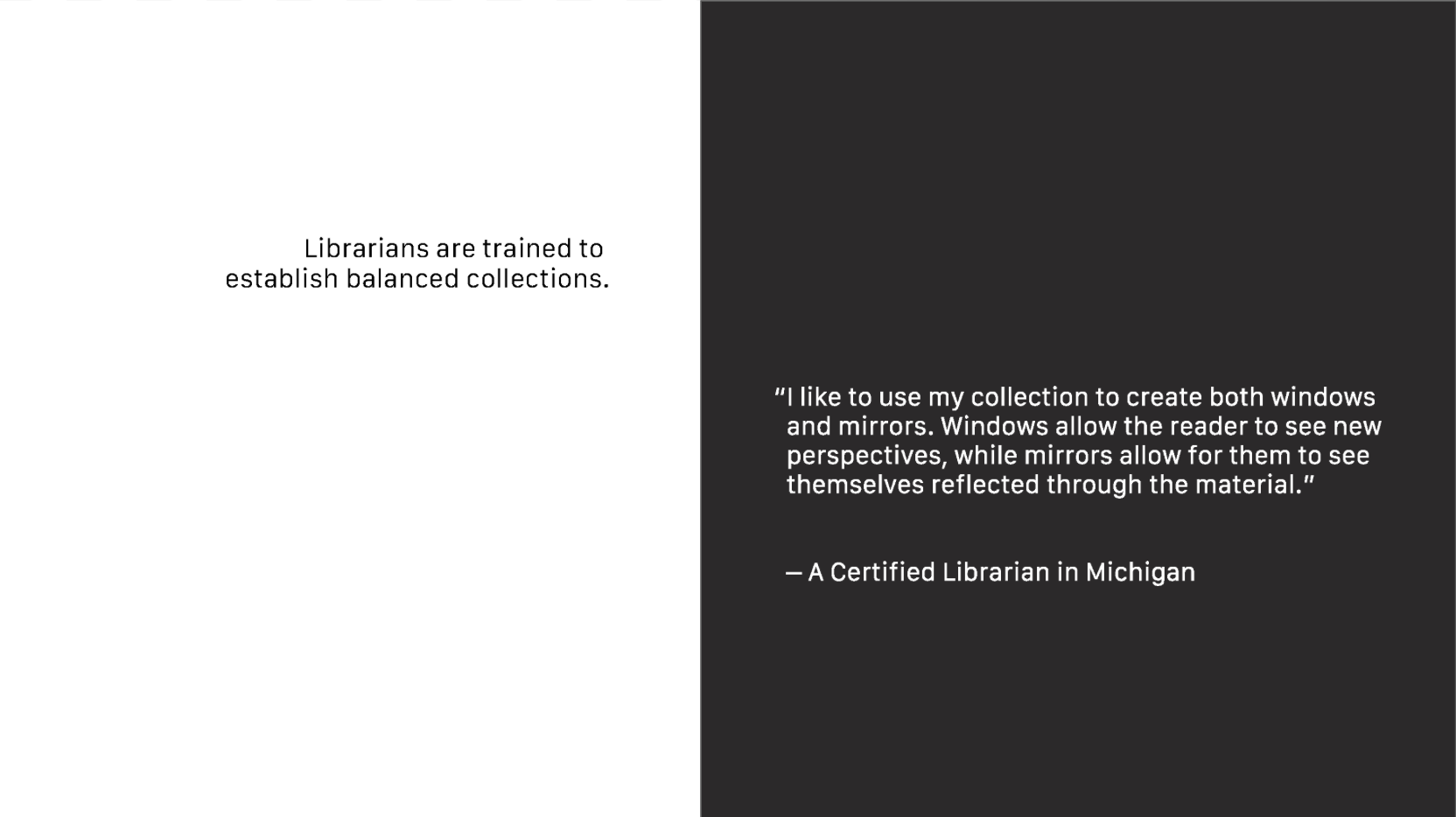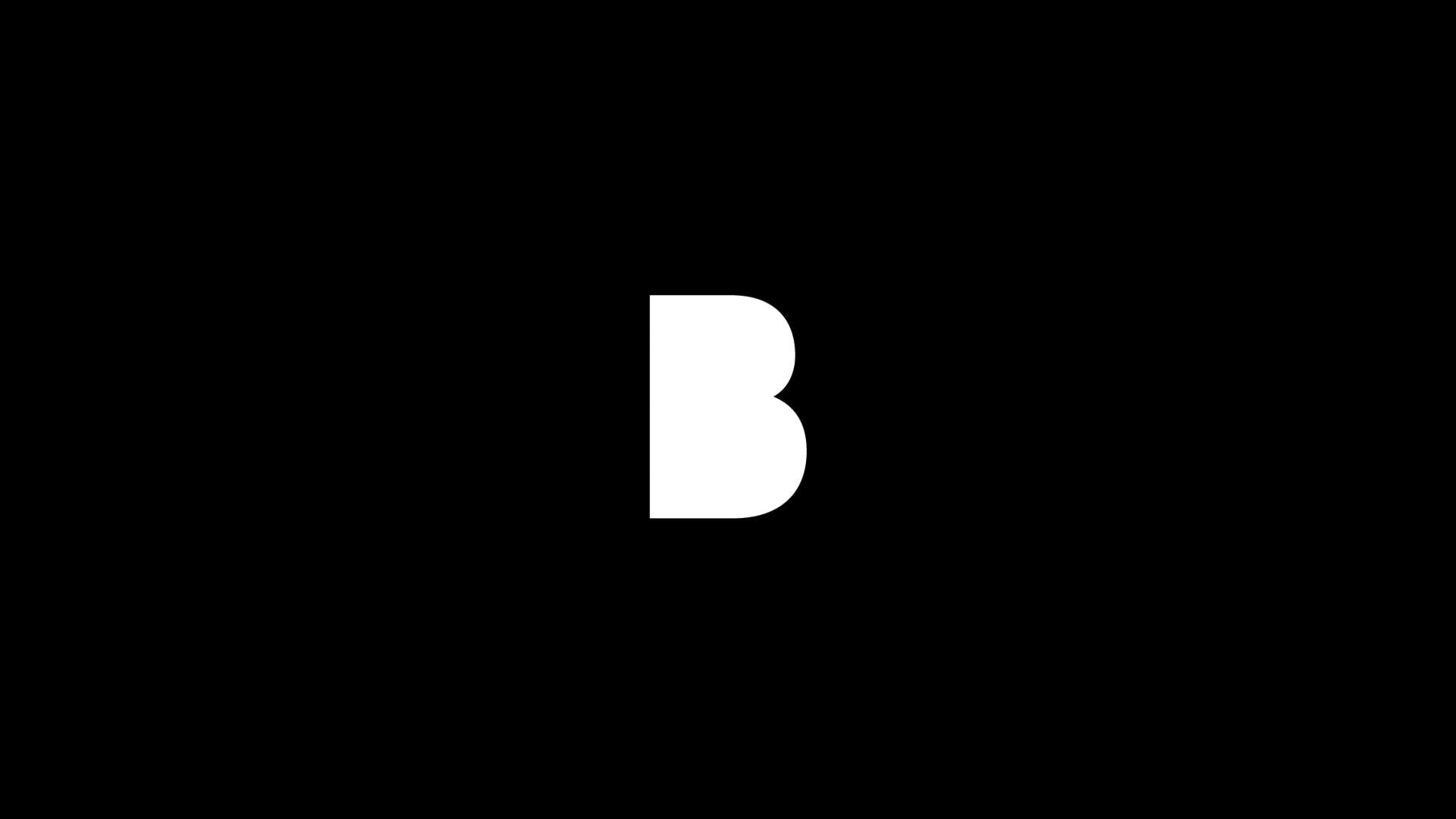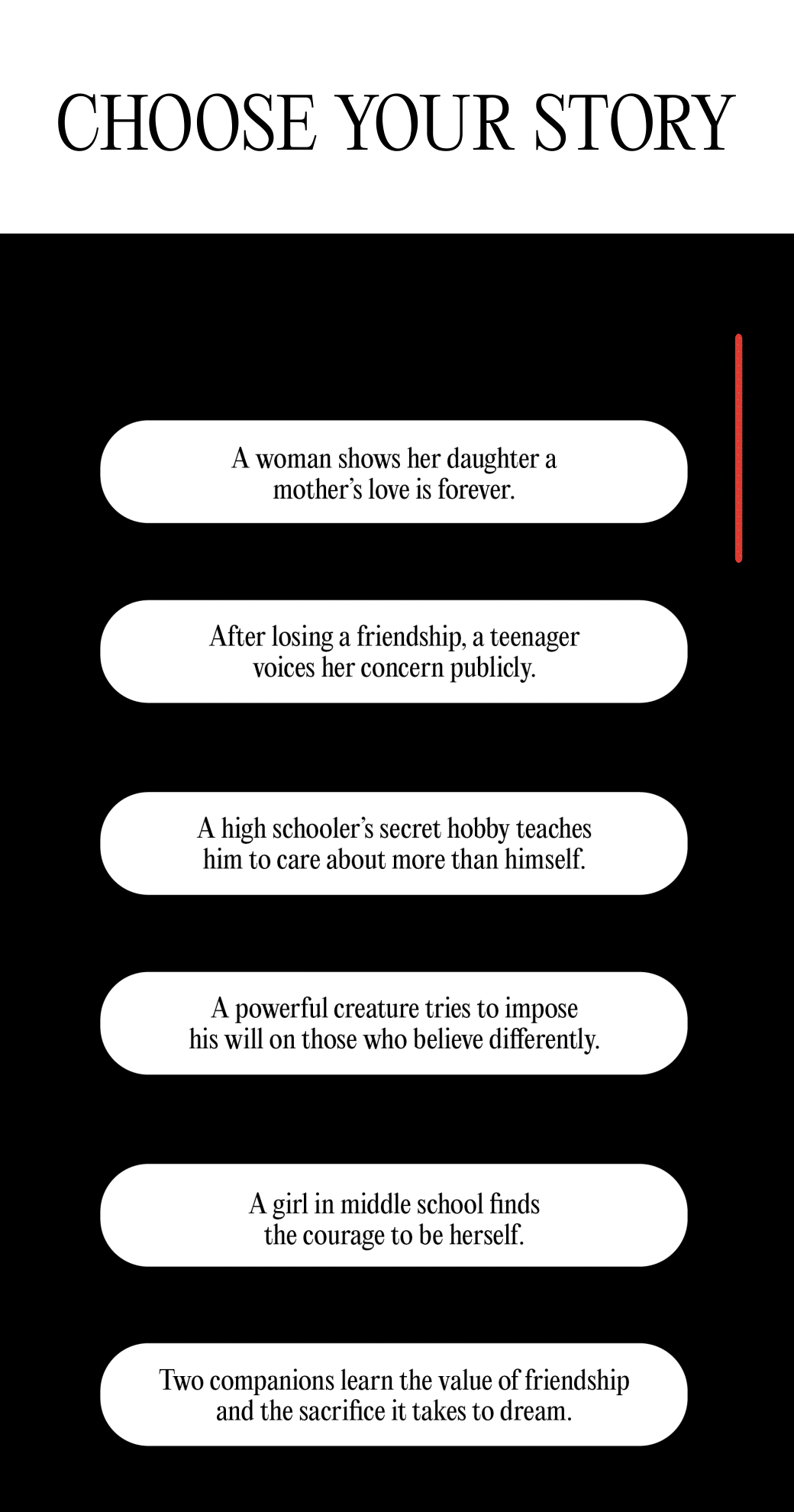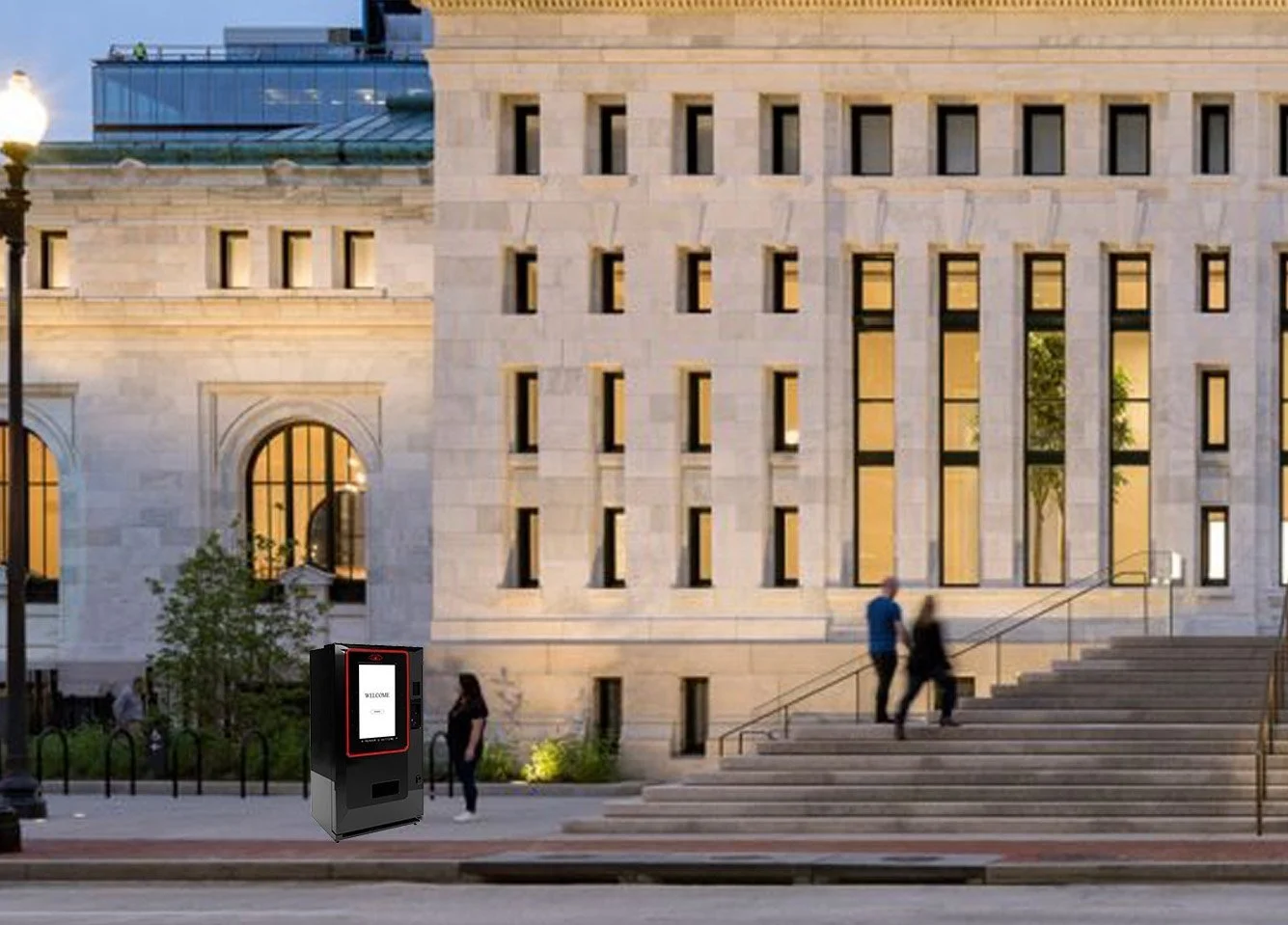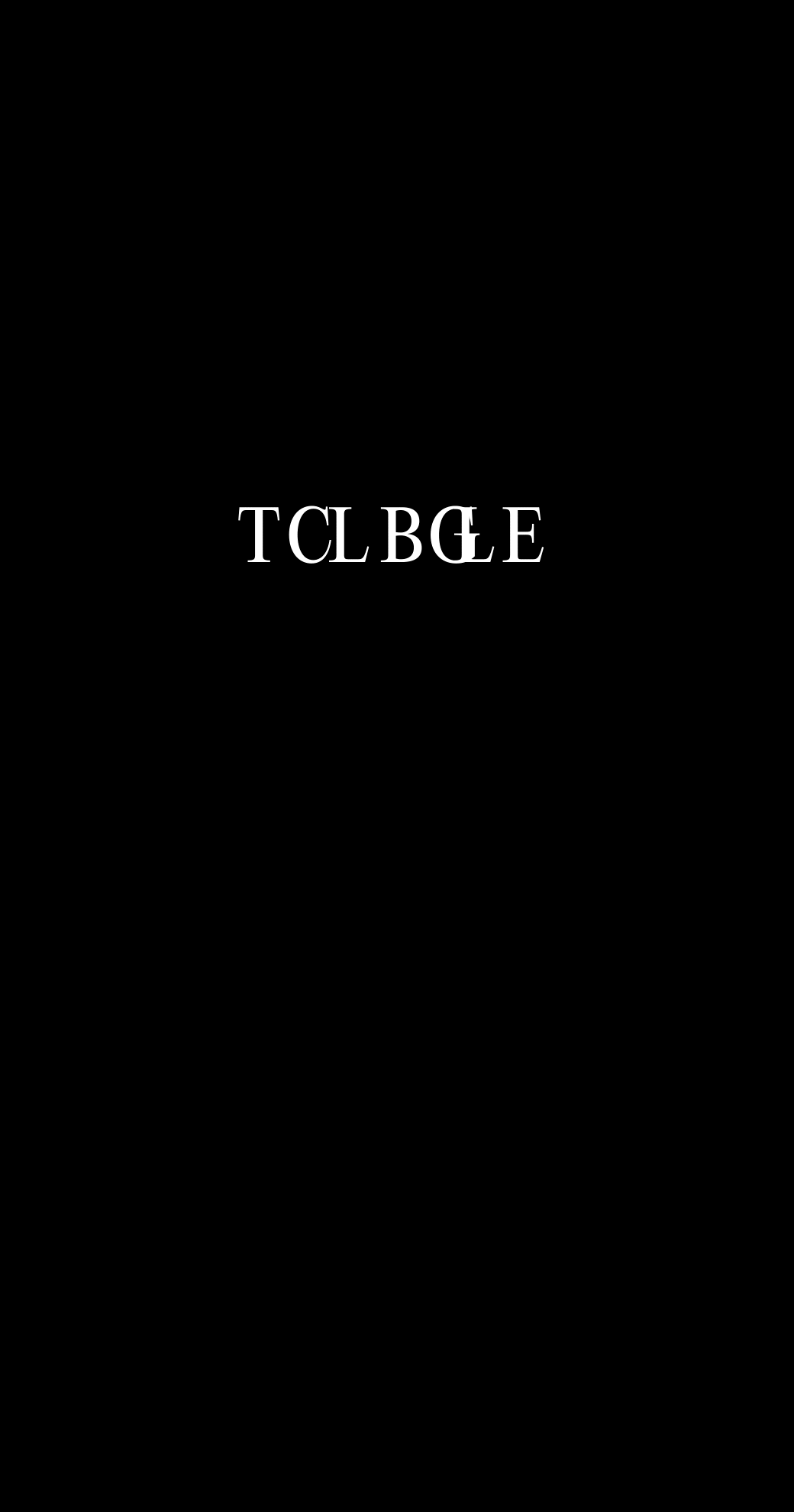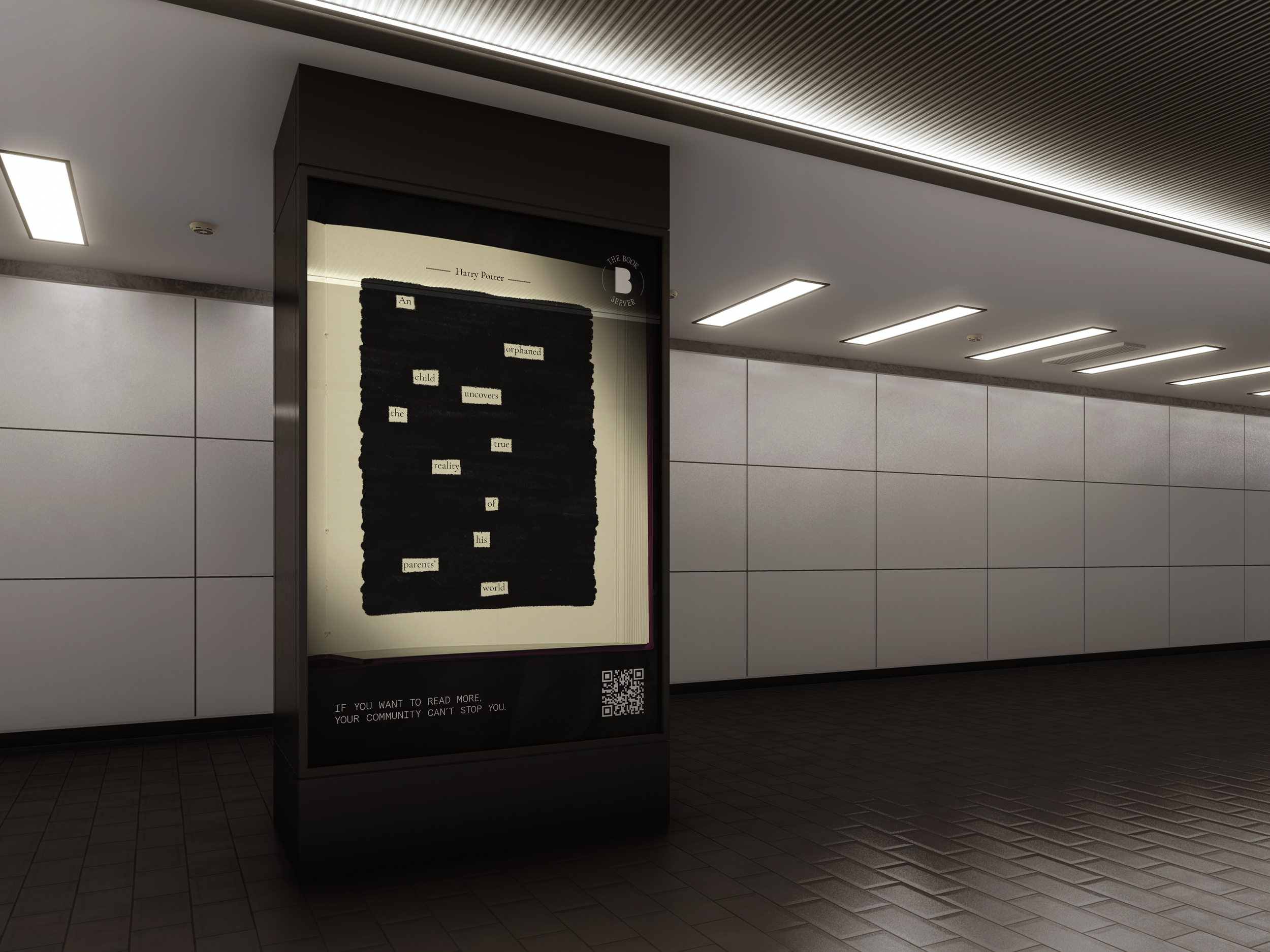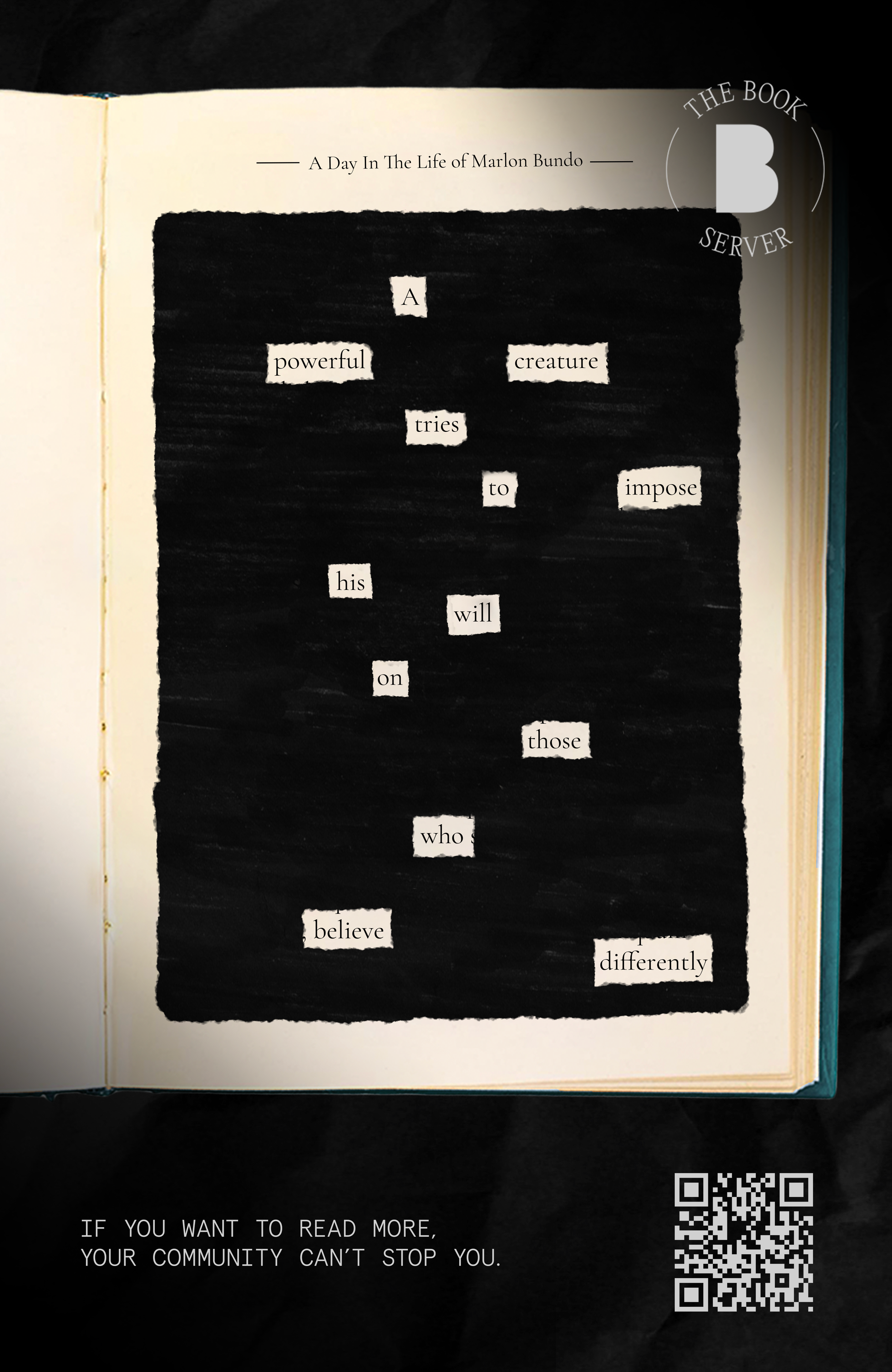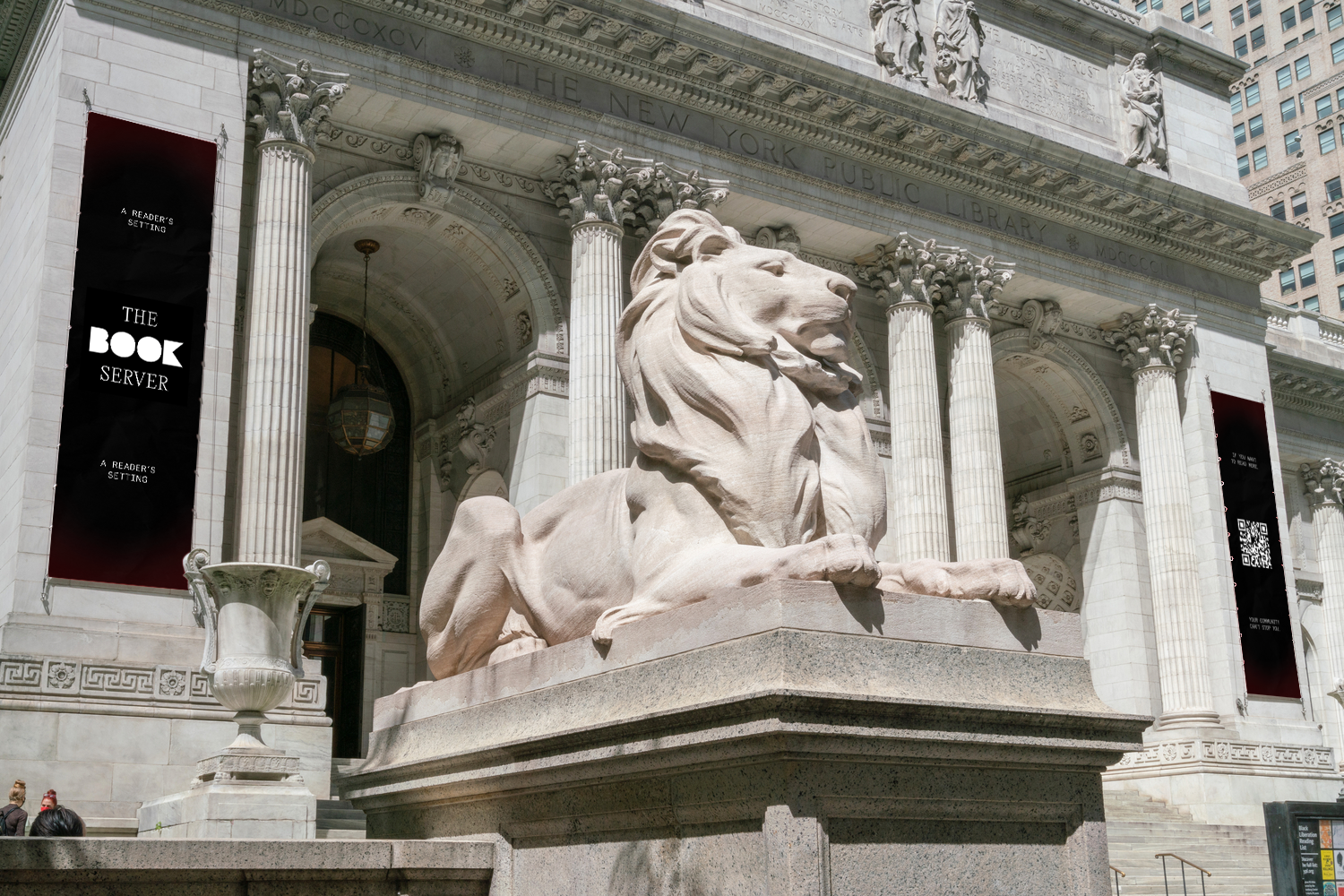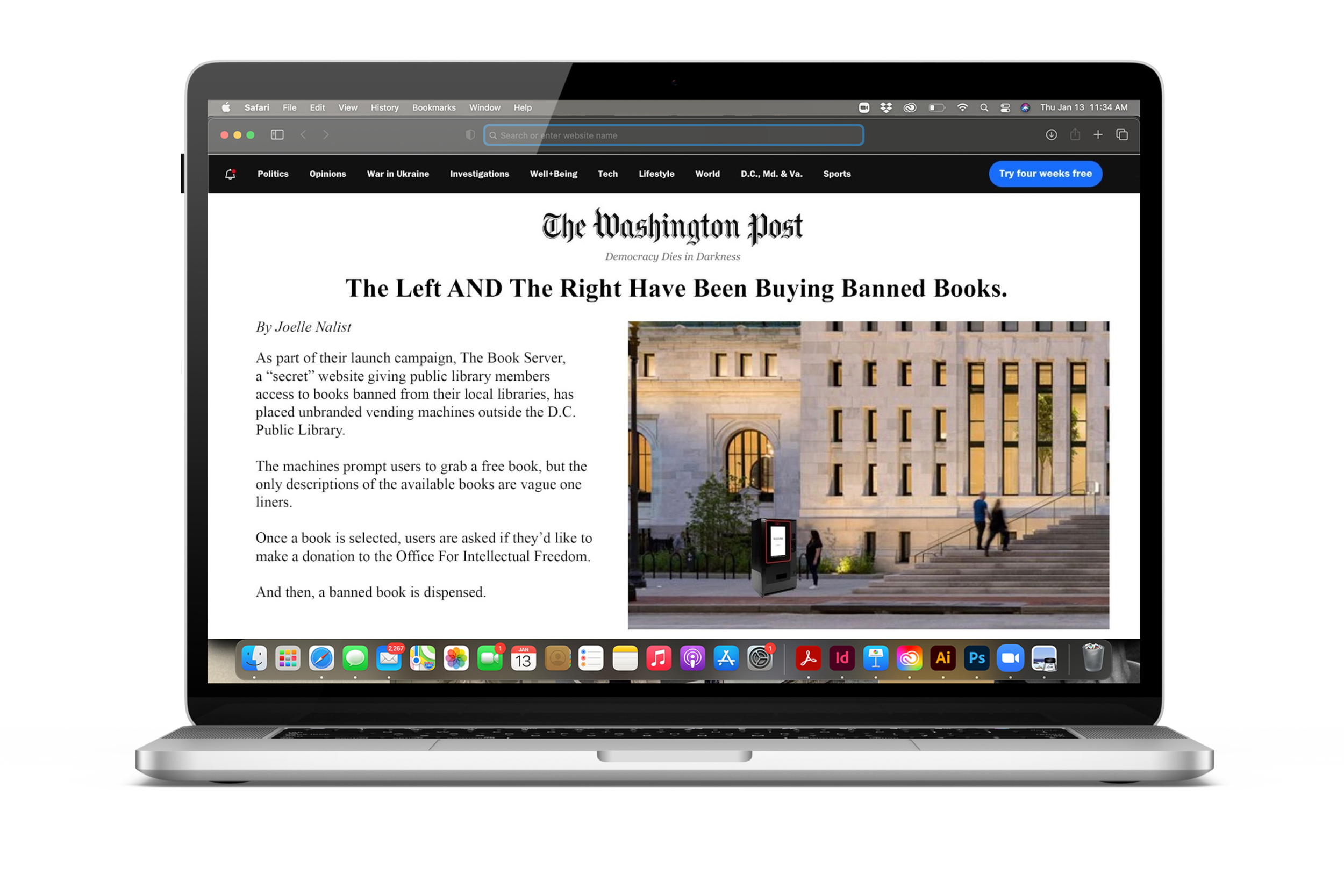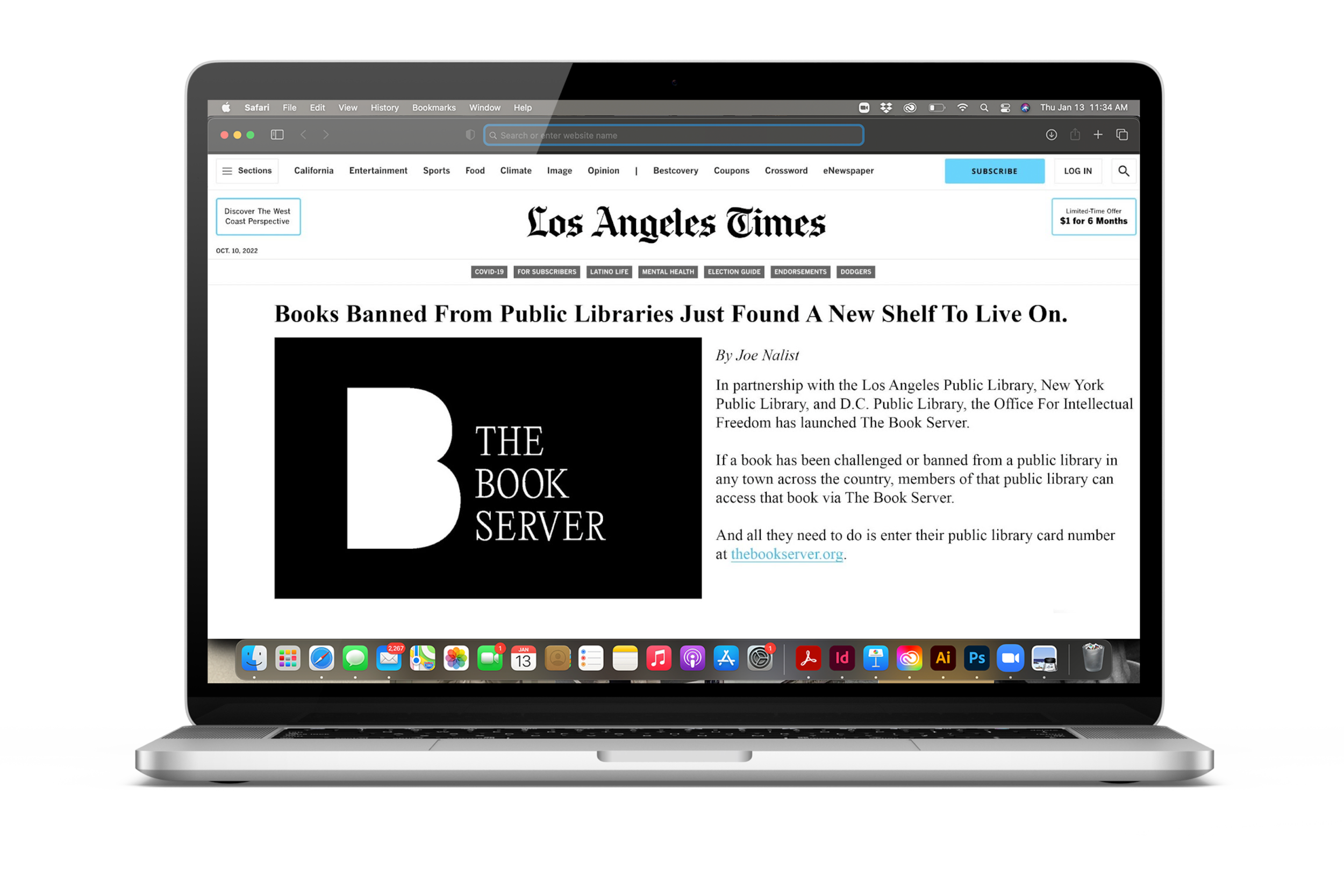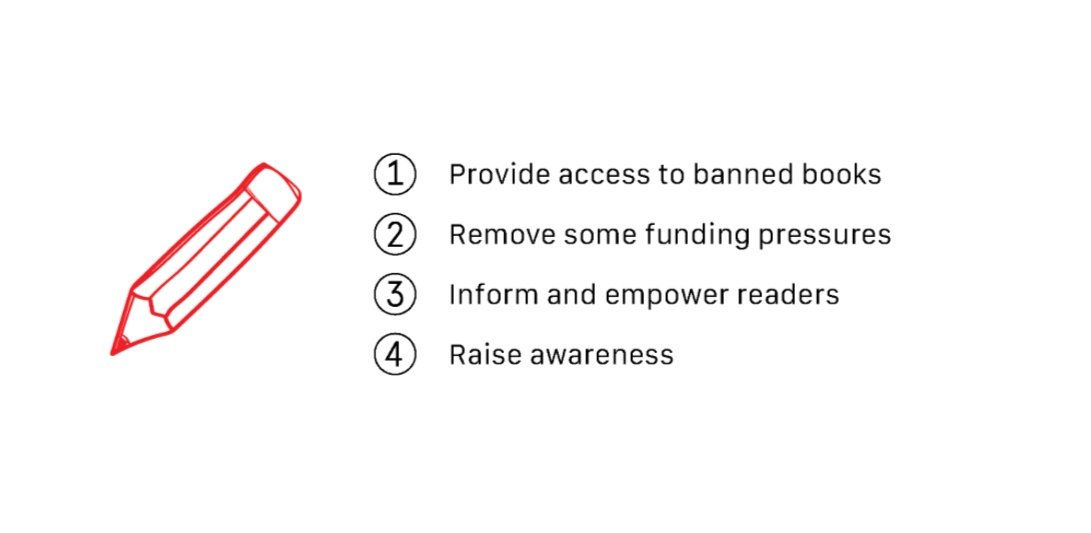THE BOOK SERVER
Purpose-Driven Experiential Campaign
SHORT & SWEET
The Ask: How can The American Library Association (ALA) aid public libraries in their efforts to maintain the Constitutional Right to Read?
The Tension: People are banning books using secrecy and politics without their communities even realizing it
The Strategy: Enable citizens to advocate for their intellectual freedom by utilizing the same rule-bending tactics used in book banning
The Solution: Access to, and advocacy for, banned books

Public libraries across America are constantly fighting to uphold the intellectual freedom guaranteed to all citizens.
Efforts to maintain balanced collections are under attack by book challengers.
Book challengers = People trying to ban books at local institutions, like public libraries.
In fact, book challenges increased by nearly 500% from 2020 to 2021.
And 2022 broke the record set the previous year for most reported challenges.
Nearly 40% of these challenges are taking place at public libraries.
Public library collections are meant to serve the entire community, not cater to the opinions of a few individuals.
Source: American Library Association
What is driving this increase?
POLITICS.
America is more divided than ever, and both sides of the aisle are using book challenges as a way to push their agenda by attempting to control the content communities are exposed to. In fact, of all the bans evaluated by PEN America, 41% are tied to directives from state officials or elected lawmakers.
Source: PEN America
How are they getting away with this?
The American Library Association has rules and guidelines in place to help prevent this from happening.
But (surprise!) book challengers ARE NOT FOLLOWING PROTOCOL.
In fact, PEN America discovered that nearly all of the bans they evaluated did not adhere to these guidelines.
Not only that, but the Office for Intellectual Freedom estimates that up to
97% of book challenges and bans are NEVER reported.
Source: Office for Intellectual Freedom (OIF)
THE PROBLEM:
Book challengers use secrecy and politics to restrict the intellectual freedom of their communities without citizens even realizing it.
THE OPPORTUNITY:
The first step to solving this problem is helping individuals understand how to advocate for their own intellectual freedom. Anyone can report a challenge or ban. They just need to know the book is missing.
THE STRATEGY:
Take a page out of ‘their’ book. Utilize the same lack of transparency and rule-bending tactics used in book banning to enable citizens to advocate for intellectual freedom.
Introducing…
THE BOOK SERVER
The Book Server is part of a multiplatform campaign that puts the power in the hands of all people, not just those who are trying to ban books. The Book Server is a digital platform that extends access to banned books to anyone with a library card — taking community politics out of the equation. Through targeted advertising and activations that flip the script on censorship, this campaign opens people’s eyes to how important it is to tell the whole story.
The Book Server
The Book Server is an online platform available to anyone with a library card.
Utilizing similar functionality to a VPN, The Book Server gives any library members the ability to access books missing from their library through the broad collections of other major libraries. This platform is meant to offer access to banned books to people from communities that are victims of censorship.
Not only will this platform offer this access, but it will share resources for learning about this issue, show which resources are banned across the country, and give people the opportunity to report bans in their local libraries.
Banned Book Vending Machines
To (sneakily) get politicians and lawmakers involved, we will place a nondescript vending machine in Washington, D.C., where passersby can get a free book that (fun fact!) has been banned at some point in history. However, the user will have to choose the story based on a restricted summary that tells an unbiased reflection of what the book is about. Vended books will be wrapped in a paper covering and stamped with the word ‘BANNED.’ All payments at this vending machine will go toward funding OIF grants that help to support public libraries.
This serves as an additional way to tangibly visualize this problem - showcasing how we are affected by a lack of fully knowing what’s going on. By placing this in Washington, D.C. we are targeting politicians, as they are the ones in charge of making the policy that could prevent books from being banned.
Library Book Insert
To be an ally to librarians, The Book Server has created books that can live on the shelf where a banned book may have been removed — or where a book should be that they didn’t feel safe ordering in the first place. This puts the power into the hands of the community to not only report the missing book to OIF, but to get access to that missing book via the online platform.
Although most librarians support access for all to books, and make every effort to develop comprehensive, balanced collections, even librarians still need help from The Book Server. When librarians speak out against book banning, they are putting both themselves and their library’s existence at risk. The majority of library funding comes from local sources — so fighting against local politics could cause the library to cease to exist.
Social Activation
We are using censorship to retell the story of banned books to capture the truth of what the story is really about and draw attention to how censorship can have a huge impact on how a story is perceived.
Social ads will be targeting individuals in communities where books are more likely to be banned. These are typically communities with a larger political divide, especially as many bans come directly from political directives.
OOH
Placed in high-traffic where people often read, like subways and coffee shops, these OOH ads once again use censorship to our advantage. By utilizing the same tactic used to hide certain parts of books, we highlight the real story being told. This encourages people to see the book for the story it truly tells.
The tabletop designs and posters will also be free and accessible to all public libraries to print and disperse throughout their establishment.
NY Public Library Takeover
The New York Public Library has long been an ally to library programs like the OIF. Not only that, but they offer their own advocacy opportunities against banning books. The collection hosted by the NY Public Library is also one that will be accessible via The Book Server.
We will takeover the outside of the New York Library – this will not only help spread the word about The Book Server, but will attract press coverage of this issue.
Earned Media
We expect for The Book Server to garner earned media, as it exploits the underhanded tactics used by book banners while raising awareness of the increasing prevalence of book banning.
For example, The Washington Post may comment on the vending machine targeting politicians on both sides of the aisle.
Bringing this to Life.
The Office for Intellectual Freedom is the section of the American Library Association designed to handle threats to intellectual freedom, such as book banning. The ALA is the oldest and largest library association in the world. As the most trusted resource for library guidance, and the primary governing body for libraries in America, the ALA is an essential partner for bringing this initiative to life.
Knowing that the ALA and OIF have access to limited funds, we would partner with Google to make this happen. Google has a longstanding relationship with the ALA and, as a company founded to make information available at the click of a button, their commitment to intellectual freedom aligns with the values driving our initiative.
Overall Campaign Goals:
Through The Book Server…
WE ENVISION A WORLD WHERE
the reactions to these balanced collections result simply in choosing a different book, rather than trying to ban its existence.
And thus a world where The Book Server has become obsolete.
THE TEAM:
Morgan MacLachlan, Art Director
Lindsey Evans, Art Director
Eli Reece, Copywriting
Kate Coleman, Strategy
My Role:
Team leader
Industry & market research
Problem definition
Audience research
Strategy development
Deck narrative
Avid reader & book advocate


